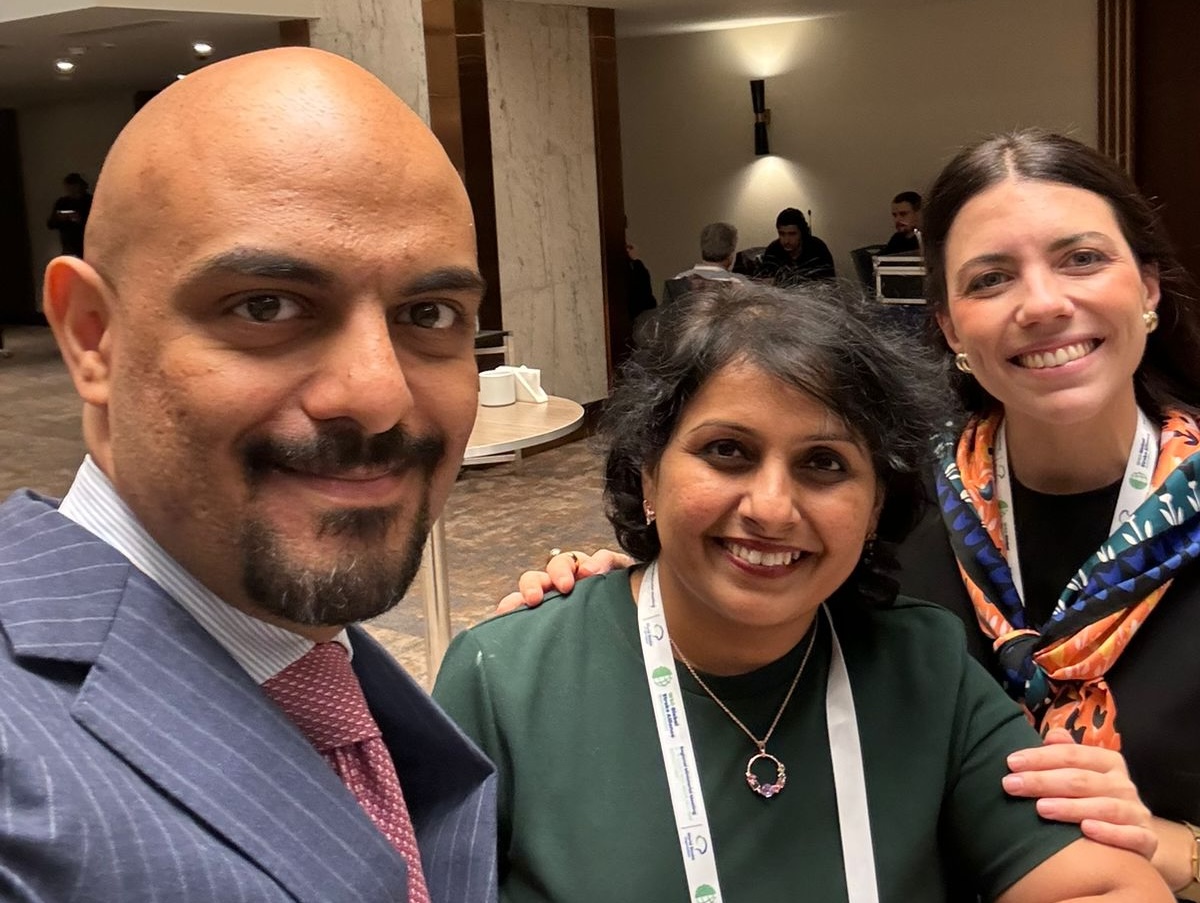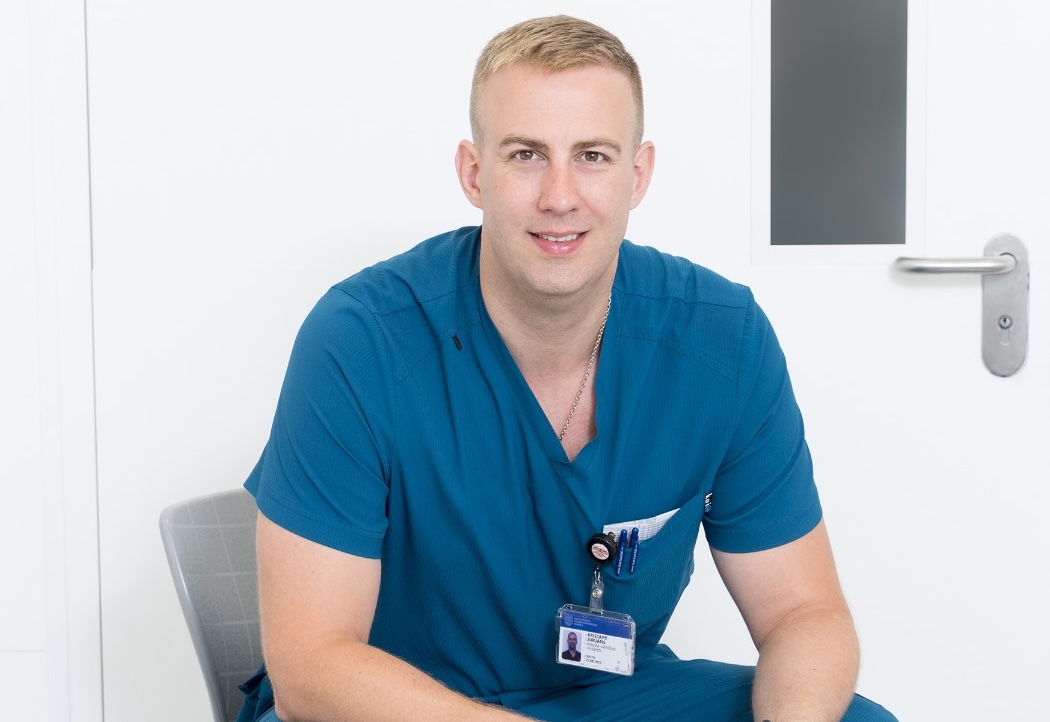Post-acute simulation training in Aveiro, Portugal, came about by chance and delivered a lasting lesson about teamwork and communication.

Chance favours the prepared mind, Louis Pasteur said – by which the famous French chemist meant that the opportunities granted by serendipity, whether in science or in life, are only exploited by those who are attentive and wise. This is how it came about that a chance encounter in Hungary lead to a simulation training breakthrough in Portugal that has the potential to impact post-acute stroke care in countless more hospitals.
The story begins in Budapest with a chance meeting between the Angels Initiative’s Cláudia Queiroga and Maria Assunção Matos, a speech and language therapist and lecturer at the School of Health Sciences at the University of Aveiro. They had both travelled to Budapest to learn more about nutrition and dysphagia in stroke patients. By the time they flew back to Portugal, the seed had been planted for a training intervention in post-acute stroke care that would be turn out to be a first for both.
The power of simulation
Stroke pathway simulation is a cornerstone of the training facilitated by Angels and a powerful tool for demonstrating the impact of key priority actions on treatment times in the hyper-acute phase. A paper published in the European Stroke Journal on behalf of the Simulation Committee of the ESO cites evidence that trainees who acquired their skills via simulation performed up to 69% better than their traditionally trained colleagues, and goes on to state: “Simulation- based team training can improve team performance by improving communication, teamwork, and leadership... In the ischaemic stroke setting, simulation training showed its efficacy in terms of improvement of knowledge, gain of time, teamwork, multidisciplinary exchange of competences, and confidence of health professionals in emergency situations.”
Simulation of the pre-hospital and hyper-acute phase has helped many Angels hospitals and ambulance teams deliver a higher quality of care, decrease treatment delays and improve patient outcomes.
But what Cláudia and Assunção had in mind as they landed in Lisbon was a simulation of post-acute care at Simula, the Clinical Simulation Centre of the University of Aveiro.
Journey back to life
In post-acute care a stroke survivor takes their first steps into an unfamiliar world. Depending on the severity of their case, they may present some difficulty in communicating, or be unable to communicate at all. Their mobility may be compromised, and neurological damage as a result of stroke may have caused a swallowing disorder called dysphagia which if left undetected can cause aspiration, poor nutrition and pneumonia.
Patients recovering from stroke are extremely vulnerable, and they and their family will rely on the integrated care and intervention of a multidisciplinary team of stroke specialists to support their functional recovery, to relearn the skills they lost, and to regain as much functionality and independence as possible, and to be reintegrated into society. This team should include stroke physicians, physiatrists, stroke nurses, physiotherapists, occupational therapists, speech and language therapists, physiatrists and nutritionists , clinical psychologists, and social workers. The standard of care patients receive in this phase has long-term implications for their survival and quality of life.
Angels-facilitated training in the post-acute phase prioritises the FeSS protocol for managing fever, sugar and swallowing which has demonstrated a significant reduction in death and disability, but introducing the benefits of simulation training to post-acute care would be a first.
Chance intervenes again
She’d had no idea such a technically advanced simulation centre existed in her own country, Cláudia recalls a year later. But she was quick to exploit an opportunity granted by serendipity, and with the help of Assunção and her physiotherapist colleague from the School of Health Sciences at the University of Aveiro, Ana Rita Pinheiro, the Angels team in Portugal invited teams from two hospitals to a post- acute simulation workshop at Simula at the end of April 2021.
Aveiro is located about halfway between the cities of Porto and Coimbra. For the team from Centro Hospitalar Tondela-Viseu, getting there was a one-hour car trip heading west towards Portugal’s Atlantic coast; their colleagues from Hospital Padre Américo, setting off from Penafiel northeast of Porto at the same time, got there five minutes later.
The selection of hospitals was related to Angels project implementation in the field, Cláudia says. They were either in need of a shot in the arm, or their high-level performance in the hyper-acute phase made them a logical choice for post-acute training.
And once more chance played a role. Due to Covid restrictions on the size of gatherings, only seven people from each hospital could be invited, each representing a different specialisation. This, says Angels consultant Ânia Gonçalves, turned out to be the ideal strategy to maximise the trans-disciplinary learning and lessons about teamwork they’d hoped the workshop would deliver.

Looking in a mirror
The workshop took place over two days, with day one dedicated to communication disorders and strategies to facilitate communication both with the patient and within the team. Dysphagia was the focus of day two. Participants received instruction about swallowing disorders, oral hygiene and nutrition, screening tests to detect dysphagia and strategies for trans-disciplinary intervention. In each case the teams had the opportunity to apply and test their knowledge in simulated clinical cases, followed by a multi-disciplinary discussion to review and analyse performance. Like the simulation itself, the debriefing was recorded so participants could afterwards observe their interaction as a team. “It was important for them to have a mirror of their own dynamic, so they could learn about their communication not only with the patient but with each other,” says Cláudia.
In some cases roles were swapped so participants could experience the challenges faced by other members of their team. And throughout the workshop they could count on the leadership and guidance of two outstanding teachers with a special interest in stroke.
Meet the teachers
Assunção became interested in communication disorders when as a teenager she met a group of children with autism at a scout camp. She decided there and then that she wanted to dedicate her career to helping people overcome communication problems, although she didn’t end up working with people with autism.
She says, “After I finished my studies my destiny took me to the rehabilitation service at a central hospital where I had the honour of knowing many stroke patients and their families and intervening with acquired communication and swallowing disorders. My goal rapidly became to make a difference in these people’s lives.
“These are people like me and you whose lives have changed in an instant and who have to deal with so many hard challenges. At the same time, I had the opportunity to become a lecturer and a researcher and contribute to my future colleagues’ development in the same field.”
At the first hospital she joined after graduating as a physiotherapist, Ana Rita was assigned to the stroke unit and saw a duty to enrol in stroke-specific professional training and invest in continuous learning in the field.
“With time and contact with stroke survivors I got inspired to make a difference in these people’s life,” she says. “The feeling of helping someone to become functional again and to actively participate in life for living, not just surviving, is a great reward. This reward is currently amplified by the fact that, as a lecturer and a researcher, I can reach more people, particularly therapists and other health professionals, and hopefully trigger awareness of how important constantly updated, individualised, and integrated care is for effective patient rehabilitation.”
For both these specialists and teachers their first simulation training confirmed the importance of teamwork and communication.
Let’s talk
Communication is harder to implement in the post- acute phase because more people are involved, and they aren’t often present in the stroke unit at the same time. While they all have the same goal, it is not unheard of for specialists from the same hospital to hardly know each other’s names. And yet stroke patients fare best if all the role players in post-acute care contribute equally, and when information is shared in real time with the aim of optimising patient safety, comfort and outcomes.
This is a lesson for which simulation is the ideal platform.
“Of course there are other means of teaching,” Assunção and Rita say. “But the best way to learn how to do anything is to practice. Simulation allows the trainees to practice the theoretical concepts under supervision and in a ‘real situation’ without the fear of doing things wrong and harming the patient. And giving all trainees the opportunity to participate actively in different simulated scenarios, as well as observe each other’s performance, puts them all at the same level, which promotes a cohesive and reliable relationship.
“But the debriefing that occurs after simulation is also important. Here the trainees are guided to reflect on their own practices and decisions and to acknowledge what they could have done differently. Their colleagues’ feedback is also important and easier to accept in this context.
“Multi- or trans-disciplinary teamwork becomes easier to implement when professionals communicate effectively, work together daily, recognise the value and limitations of each role, and have the opportunity to discuss each case in a structured meeting to which they all contribute as equals, and feel recognised and respected by others.”
Another advantage of simulation is that participants are exposed to the patient’s perspective, thanks to feedback from the actor who plays that role. Assunção and Ana Rita say, “The actor’s feedback on the patient’s behalf enriches the perspective of the trainee who is often focused on technical and scientific execution and unaware that they are undervaluing the view of the patient.”

Life is bigger than stroke
Six months after the first post-acute simulation in Aveiro, consultants and teachers teamed up again for a hybrid simulation workshop with a team from Hospital Pedro Hispano in Matosinhos north of Porto present, and post-acute specialists from Hospital do Litoral Alentejano connecting remotely from Santiago do Cacém south of Lisbon.
There were three reasons for experimenting with hybrid streaming, Cláudia says. “Distance, the instability caused by Covid and to see how well it worked.” The results were promising and paved the way for implementation in regions further afield.
Another innovation in round two was allowing the respective teams to observe and participate in each other’s debriefing, as a tactic to cross-contaminate good habits and share the experience in a richer way. A modified version of this tactic was later also used by Angels project manager Rita Rodrigues during a hyper-acute simulation in Lithuania.
The Simula Simulation Centre has since been used by Dr Gustavo Santo from the University of Coimbra and Dr Ana Paiva Nunes from the University Hospital of Lisbon who lead a hyper-acute simulation workshop at Simula, and there are more workshops on the calendar for June and September.
Cláudia sums up the impact a facility such as Simula can have on stroke care in Portugal and elsewhere: “Simulation is good for standardisation. It’s good for training optimisation. It is good for teams to see themselves in a mirror. It’s good for decision-making. It’s good for cross-sharing with other teams. It’s good for seeing the broader picture.”
And ultimately it is good for patients and their families, for whom Assunção and Ana Rita have the following words of advice: “You should never give up. Life changes and the challenges are enormous, but it is possible to have a new life. You just need to find the best health professionals to help you overcome challenges and believe that life is bigger than stroke!”


